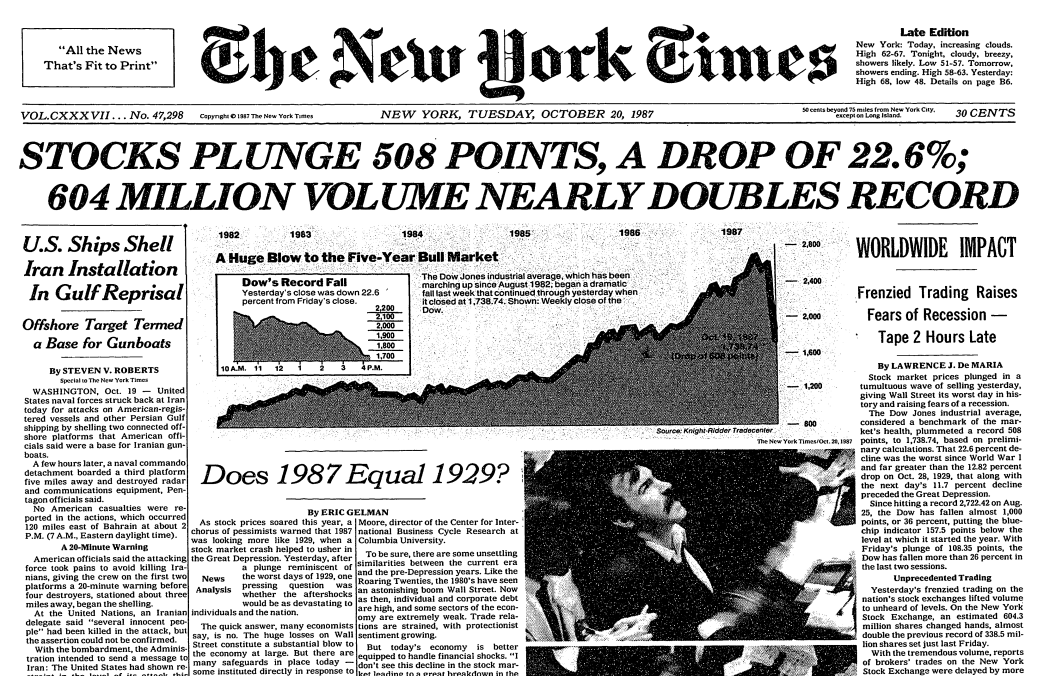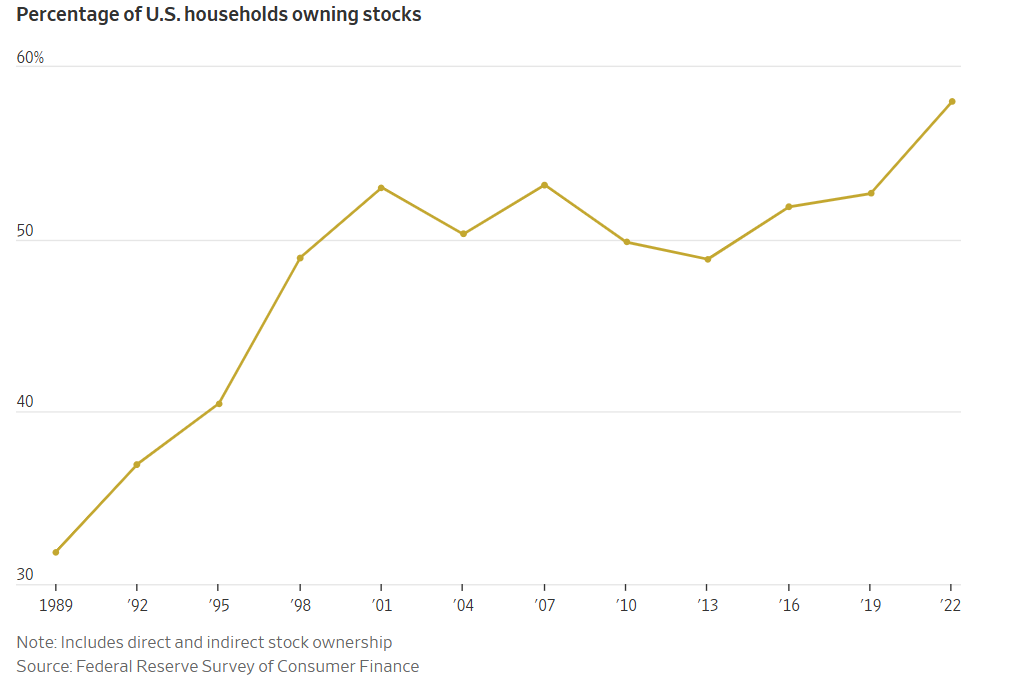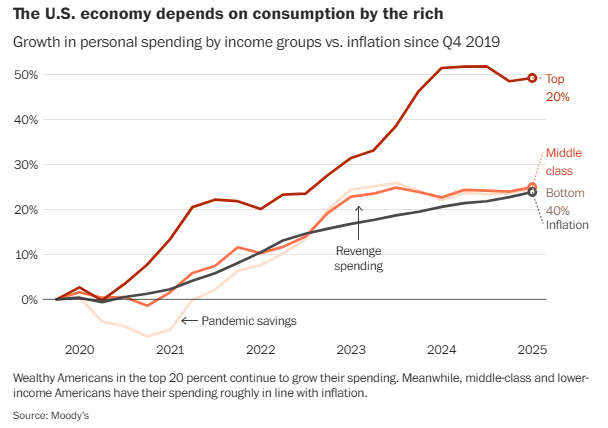The 1987 Black Monday crash was so swift and extreme that some have been questioning whether or not it was the sign of an oncoming melancholy:

Most individuals didn’t really suppose 1987 equaled 1929 however the crash was painful sufficient to trigger pundits to a minimum of take into account the chance that an financial calamity was on the horizon.
The inventory market fell greater than 20% in a single day and almost 35% over the course of per week however the financial impression was…nil.
The subsequent recession within the U.S. didn’t hit till the summer season of 1990. The inventory market completed the yr with a achieve of round 5% in 1987 and was off to the races following the crash.
The inventory market wasn’t large and highly effective sufficient to trigger an financial downturn. That’s primarily as a result of not that many individuals owned shares again then. In 1987, round 25% of U.S. households owned shares in any kind — particular person shares, mutual funds, and many others.
You may see that inventory market possession didn’t actually take off in a significant manner till the Nineties:

This chart is a few years outdated. Right this moment the quantity is 62% of households that personal shares. This enhance in possession means the inventory market is way extra necessary to extra folks than it was in 1987 (duh).
Chart Child Matt has a wonderful chart that reveals how web value has by no means been extra intertwined with the inventory market:

You may see the large leap this relationship has taken because the Nineteen Eighties.
Right here’s a very good stat from The Wall Road Journal that cements this concept:
Shares as a share of family monetary belongings surged to 36% within the first quarter, the very best stage in data going again to the Nineteen Fifties, in line with Ed Clissold, chief U.S. strategist at Ned Davis Analysis.
Now some folks take a look at this knowledge as a trigger for concern. A rising inventory market may very well be inflicting extra households to spend cash extra loosely.
If the market rolls over, that would trigger households to chop again on consumption. Nobody is aware of if this wealth impact will present up for certain however it’s definitely value contemplating.
A rising inventory market can be seemingly driving up spending for the wealthiest subset of the inhabitants. The highest 10% personal almost 90% of the inventory market.
In line with The Washington Submit they’re additionally driving many of the spending:
“Within the close to time period, all the pieces rests on what that prime 10 p.c decides to do or to not do. The remainder of the revenue distribution is de facto not consequential from a macroeconomic perspective,” Mark Zandi, chief economist at Moody’s, instructed me.
Zandi finds that the highest 20 p.c of households proceed to develop their spending, although they’ve pulled again considerably amid a lot uncertainty. In the meantime, the underside 80 p.c of households are principally simply protecting their spending development in keeping with inflation. This can be a notable shift from the “revenge spending” period from 2022 to 2024, when folks of all revenue ranges have been splurging considerably after the top of pandemic lockdowns.
This chart says quite a bit:

This isn’t all of the inventory market in fact. This group additionally makes extra money.
Primarily it is a chicken-or-the-egg difficulty — will a slowing economic system trigger the inventory market to fall or will a falling inventory market trigger folks to rein of their spending?
It’s arduous to say which one comes first.
The rising significance of the inventory market on the economic system is sweet information. Having extra folks investing in shares is an indication of progress. I hope it continues.
However it will likely be attention-grabbing to see if this rising significance finally has an impression on the economic system.
Can the inventory market trigger a recession?
The chance is greater at present than it’s ever been.
Michael and I talked concerning the rising significance of the inventory market on the economic system and rather more on this week’s Animal Spirits video:
Subscribe to The Compound so that you by no means miss an episode.
Additional Studying:
The Prime 10%
Now right here’s what I’ve been studying this week:
Books:
This content material, which incorporates security-related opinions and/or info, is offered for informational functions solely and shouldn’t be relied upon in any method as skilled recommendation, or an endorsement of any practices, services or products. There may be no ensures or assurances that the views expressed right here will probably be relevant for any specific info or circumstances, and shouldn’t be relied upon in any method. It’s best to seek the advice of your personal advisers as to authorized, enterprise, tax, and different associated issues regarding any funding.
The commentary on this “submit” (together with any associated weblog, podcasts, movies, and social media) displays the non-public opinions, viewpoints, and analyses of the Ritholtz Wealth Administration staff offering such feedback, and shouldn’t be regarded the views of Ritholtz Wealth Administration LLC. or its respective associates or as an outline of advisory providers offered by Ritholtz Wealth Administration or efficiency returns of any Ritholtz Wealth Administration Investments shopper.
References to any securities or digital belongings, or efficiency knowledge, are for illustrative functions solely and don’t represent an funding suggestion or supply to supply funding advisory providers. Charts and graphs offered inside are for informational functions solely and shouldn’t be relied upon when making any funding choice. Previous efficiency shouldn’t be indicative of future outcomes. The content material speaks solely as of the date indicated. Any projections, estimates, forecasts, targets, prospects, and/or opinions expressed in these supplies are topic to vary with out discover and should differ or be opposite to opinions expressed by others.
The Compound Media, Inc., an affiliate of Ritholtz Wealth Administration, receives fee from varied entities for commercials in affiliated podcasts, blogs and emails. Inclusion of such commercials doesn’t represent or suggest endorsement, sponsorship or suggestion thereof, or any affiliation therewith, by the Content material Creator or by Ritholtz Wealth Administration or any of its staff. Investments in securities contain the chance of loss. For extra commercial disclaimers see right here: https://www.ritholtzwealth.com/advertising-disclaimers
Please see disclosures right here.